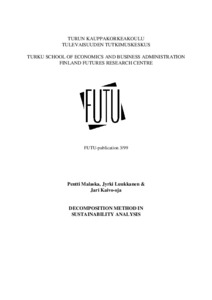| dc.contributor.author | Malaska, Pentti | |
| dc.contributor.author | Luukkanen, Jyrki | |
| dc.contributor.author | Kaivo-oja, Jari | |
| dc.date.accessioned | 2020-09-23T08:03:06Z | |
| dc.date.available | 2020-09-23T08:03:06Z | |
| dc.date.issued | 1999 | |
| dc.identifier.uri | https://www.utupub.fi/handle/10024/150437 | |
| dc.description.abstract | Decomposition approach is a way to analyse a society and its structural changes. It can be applied in the analyses of energy, material, labour and capital use. Linking the decomposition analyses to sustainability remarkably widens the scope of efficiency analysis that has been the traditional way to utilise decomposition in the case of energy studies. The formulas given above can be utilised in sector or international analyses and comparisons of economies. The presented exact decomposition method together with the developed sustainability models are powerful tools to analyse the development of societies and their sustainability in quantitative terms. | |
| dc.language.iso | eng | - |
| dc.publisher | fi=Turun yliopisto. Turun kauppakorkeakoulu|en=University of Turku, Turku School of Economics| | - |
| dc.relation.ispartofseries | FUTU-publication | - |
| dc.title | Decomposition method in sustainability analysis | - |
| dc.identifier.urn | URN:ISBN:951-738-952-3 | - |
| dc.contributor.faculty | fi=Turun kauppakorkeakoulu|en=Turku School of Economics| | - |
| dc.contributor.studysubject | fi=Tulevaisuudentutkimus|en=Futures Studies| | - |
| dc.contributor.department | fi=Tulevaisuuden tutkimuskeskus|en=Finland Futures Research Centre| | - |
| dc.format.content | fulltext | - |
| dc.relation.numberinseries | 3/99 | - |
